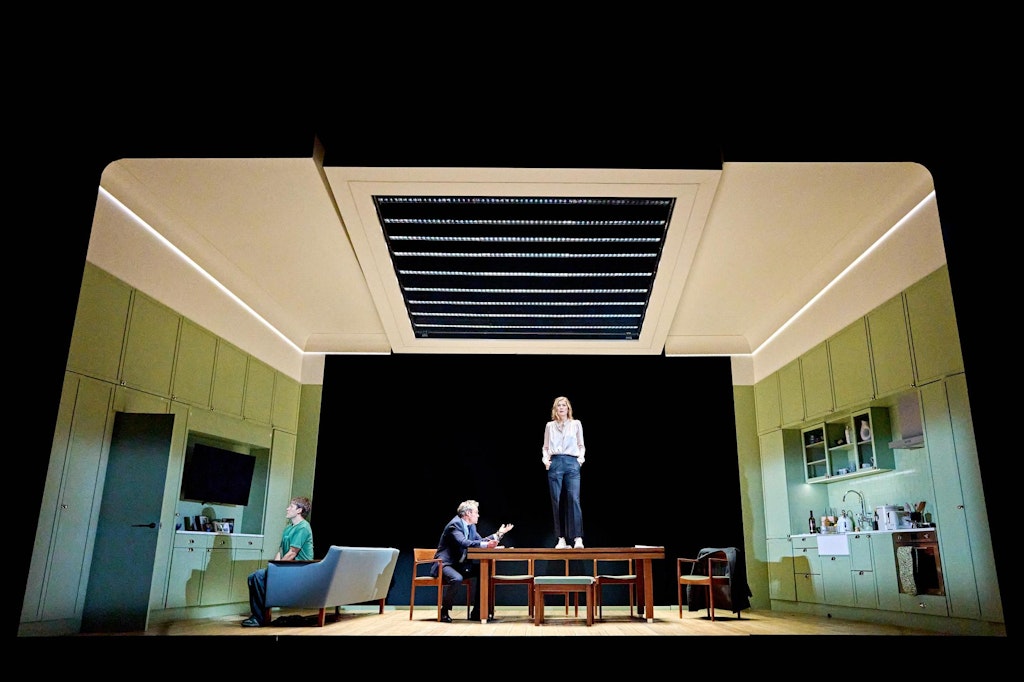Imagine the recent Netflix series Adolescence, but in an upper-middle-class, educated legal milieu, and you’re some of the way to understanding Suzie Miller’s hot-button and thoroughly provocative new play, premiering as one of the final productions that Rufus Norris has overseen in his regime at the National Theatre. I have not always been the biggest fan of Norris’s artistic directorship, but honesty compels me to report that he has had his hits as well as his flops, and this is a hard-hitting and thoroughly gripping 105-minute voyage into the dark side of apparently blessed lives, in which the grim sceptre of adolescent sexual urges can tear a family apart.

Much of the play’s appeal lies in the central performance by Rosamund Pike as Jessica Parks, a high-flying KC turned equally high-flying judge. By day, she attempts to mix compassion with justice, and sternly remonstrates with barristers who she believes are attempting to belittle timid or emotional witnesses in rape cases. When she leaves court, it’s into a social whirl of karaoke nights with other lawyers, dinner parties with similarly high-flying professionals and time with her slightly less successful barrister husband Michael and her withdrawn eighteen year-old son Harry. Jessica has the same complaints and grumbles that every other successful type of her calibre has: a sense that she is taken for granted by her family, and the belief that, as a woman in a man’s world, she has to be above any kind of criticism. It would, after all, be a terrible shame if all her effort — to say nothing of her moral and legal expertise — was ever to be questioned, especially if something close to home was to explode.

To say more would be to spoil many of the play’s intricately created and ethically complex dilemmas, which are teased throughout the first half before coming into sharp, horrible focus in the second. As with Miller’s previous play Prima Facie, which starred Jodie Comer and dealt with questions of sexual assault in the legal profession, this one rests almost entirely on the shoulders of its lead. Pike is on stage for the entire duration and delivers large chunks of the drama as a monologue to the audience, occasionally breaking off to interact either with her husband (Jamie Glover, the epitome of a man who calls his son “mate”) or Harry (an impressive Jasper Talbot), both of whom come to represent different aspects of modern masculinity in all its toxic complexity. It should be noted, however, that this is no one-sided misandrist rant, and that Inter Alia’s strengths lie in the way in which there are no straightforward answers to the impressively knotty moral conundrums that it presents.
This is a gripping, frequently electrifying play, with a major star performance at its heart

The evening belongs to Pike, returning to the stage after far too long. Just as Comer won virtually every award going, so she should start writing her acceptance speeches for the inevitable Olivier award, and, if the play transfers to Broadway, the Tony too. She gives a virtuosic, force-of-nature performance that brilliantly begins with her emerging, wigged and gowned, from beneath the stage on a hydraulic lift, as if she were about to launch into a show-stopping opening number, and she demonstrates an impressive vocal range in one of the show’s karaoke scenes, too. Over the course of the next hour and three quarters, her superlative work is counterpointed by Justin Martin’s virtuoso direction, in which Miriam Buether’s set and costume design keeps shifting every few moments. One scene might take place in the family’s kitchen, and then the next segues into a desolate-looking wooded landscape.

There is a breathtaking slickness to the production that brings a West End musical to mind, but this is no all-singing, all-dancing fantasia. Instead, by the final reckoning, Miller asks some tricky questions that allow all three actors to shine. Pike’s judge — who is introduced in full belligerent, “My courtroom, my rules!” girlboss mode — has to explore the difference between public utterance and private compromise in the most personal and painful of ways. Glover’s confident alpha male finds the essential weakness inside himself that his bluff, laddish persona has suppressed, and Talbot’s journey from weak, easily persuadable boy on the cusp of adulthood to the unexpected moral centre of the play is one that stands as the flip side to the cruder, more schematic arguments expressed in Adolescence, where a thirteen year-old boy suddenly turns into a Nietzschean superego.
If Miller’s play itself is not perfect — by the time that the storyline gets going, the beats of the drama can be seen coming — then it is both measured and timely in its exploration of the all-pervasive manosphere and its corrosive effects on young men who are easily seduced (sic) into thinking that they have a right to sex and intimacy: damn the feelings of anyone else involved. Yet as the three characters here — and, by extension, the audience — discover, sex is a question of far more than simple desire. This is a gripping, frequently electrifying evening at the theatre, with a major star performance at its heart, and represents a worthy send-off to the Norris regime. Would that more plays of this calibre had been seen over the past decade.












